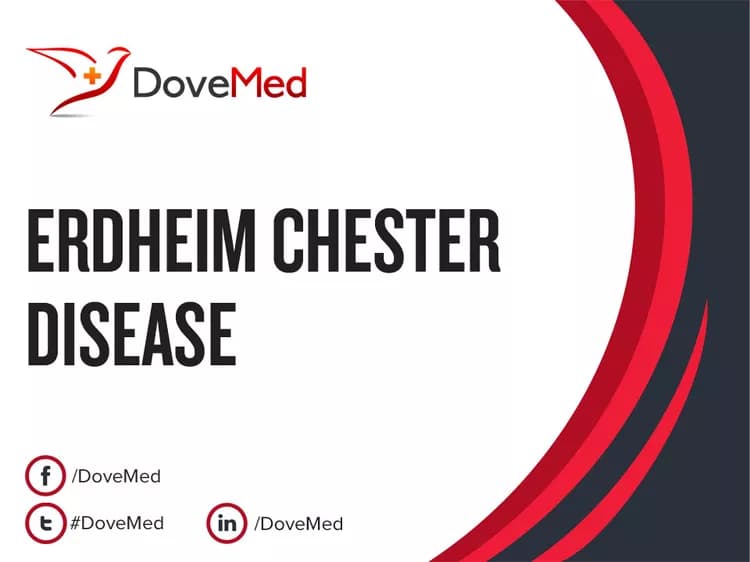What are the other Names for this Condition? (Also known as/Synonyms)
- Erdheim-Chester Syndrome
- Lipogranulomatosis (Erdheim Chester Disease)
- Polyostotic Sclerosing Histiocytosis
What is Erdheim Chester Disease? (Definition/Background Information)
- Erdheim Chester Disease (ECD) is a highly infrequent disorder affecting multiple body systems of an adult, due to excess production and collection of histiocytic cells in the tissues and organs, of a human body
- Histiocytes are immune cells that form in the bone marrow. They are responsible for protecting the body by consuming foreign material that may be present in the body
- Histiocytic accumulations can occur anywhere in the leg bones, skin, lungs, brain, and other body parts, resulting in fever, pain, inflammation, diabetes, multiple organ failure, and many serious complications
- The causative factor of ECD is unknown
- Treatment measures range from administration of chemotherapy, use of corticosteroids, and radiation therapy. However, the prognosis is dismal
Who gets Erdheim Chester Disease? (Age and Sex Distribution)
- Adults in the age group of 50-70 years are affected the most; though, quite rarely, it has been observed in children and young adults
- Both males and females can be affected. A slight male inclination is noted with Erdheim Chester Disease
- With only around 100 cases having been reported worldwide; there is no predilection towards any racial/ethnic group
What are the Risk Factors for Erdheim Chester Disease? (Predisposing Factors)
The exact cause of Erdheim Chester Disease is unknown, and so are its risk factors.
It is important to note that having a risk factor does not mean that one will get the condition. A risk factor increases ones chances of getting a condition compared to an individual without the risk factors. Some risk factors are more important than others.
Also, not having a risk factor does not mean that an individual will not get the condition. It is always important to discuss the effect of risk factors with your healthcare provider.
What are the Causes of Erdheim Chester Disease? (Etiology)
- Erdheim Chester Disease causes an excessive number of histiocytes (immune cells) to form and accumulate in various organs around the body, with life-threatening implications
- However, why this process happens and the reason behind this abnormality is not understood
What are the Signs and Symptoms of Erdheim Chester Disease?
Several body parts and internal organs may be involved, but these are not uniformly similar for all individuals. The common signs and symptoms of Erdheim Chester Disease are:
- Involvement of the long leg bones is a distinct and universal sign of ECD (bilateral symmetry is noted). Knee and leg pain, osteosclerosis (increased density of bone), bone thickening, muscle and joint aches are seen
- Other bones that could be involved are the jaw bones and vertebrae
- Nervous system involvement may lead to impaired muscles, lack of muscular coordination, walking problems, and involuntary eye movements
- Presence of yellow fatty nodules on the skin and eyelids. Protrusion of the eyes can be seen
- Dry cough, difficulty in breathing; caused by thickening of lung tissue
- Inability of the heart to pump blood to other body parts, resulting from heart failure
- Pituitary gland problems causing excess thirst and urination, reduced pituitary hormone production
- Signs and symptoms due to diabetes, anemia
- Weight loss, malaise/fatigue
How is Erdheim Chester Disease Diagnosed?
Erdheim Chester Disease is diagnosed by:
- Physical examination, evaluation of the individual’s medical history
- MRI, CT scan of the bones
- X-ray studies (of the skeletal system)
- Biopsy of affected tissue: A pathologist examines the tissue under a microscope before arriving at a definitive diagnosis. A microscopic examination by a pathologist is considered to be gold standard in diagnosis of the tumor
- Tests performed to eliminate a disorder called Langerhans Cell Histiocytosis (LCH)
Many clinical conditions may have similar signs and symptoms. Your healthcare provider may perform additional tests to rule out other clinical conditions to arrive at a definitive diagnosis
What are the possible Complications of Erdheim Chester Disease?
Depending on specific organs and body systems involved, Erdheim Chester Disease complications vary. These may include:
- Pulmonary (lung-related) problems, such as pulmonary fibrosis, lung failure
- Cardiac complications, such as heart failure
- Severe form of diabetes insipidus due to pituitary gland involvement
- Acute neurological problems
- Kidney failure resulting in impaired kidney function
How is Erdheim Chester Disease Treated?
- Symptomatic treatment and management of Erdheim Chester Disease presentation, is usually undertaken
- Use of corticosteroids, chemotherapeutic, immunosuppressant drugs may be used to control cell proliferation
- Use of radiation therapy to destroy excessively forming histiocytic cells
- Surgical removal of mass lesions
How can Erdheim Chester Disease be Prevented?
Current medical research has not established a way of preventing Erdheim Chester Disease occurrence.
What is the Prognosis of Erdheim Chester Disease? (Outcomes/Resolutions)
- Current medical and healthcare advances have had limited success in treating Erdheim Chester Disease. In general, the outcome of an individual with the condition, is not positive
- Most fatalities are due to heart, lung, central nervous system, or kidney complications; occurring usually within 2-3 years of disease onset
Additional and Relevant Useful Information for Erdheim Chester Disease:
Erdheim Chester Disease (ECD) bears a close resemblance to Langerhans Cell Histiocytosis (LCH), another disorder that is characterized by an excess proliferation of histiocytic cells, and affecting young children. Some of the signs and symptoms of LCH overlap with ECD.
Related Articles
Test Your Knowledge
Asked by users
Related Centers
Related Specialties
Related Physicians
Related Procedures
Related Resources
Join DoveHubs
and connect with fellow professionals


0 Comments
Please log in to post a comment.